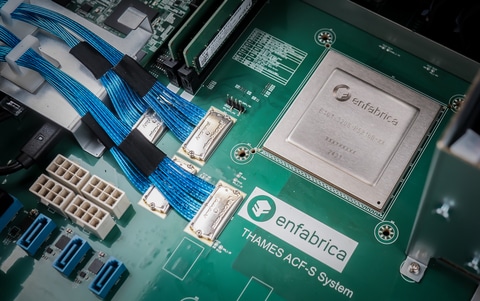Enfabrica Corporation, a provider of high-performance networking silicon, makes its Accelerated Compute Fabric (ACF) SuperNIC chip available. With a bandwidth of 3.2 Terabits per second (Tbps) and multi-port 800-Gigabit Ethernet connectivity, the ACF SuperNIC is designed to deliver four times the bandwidth and enhanced multipath resiliency compared to existing solutions. Initial quantities will be available in Q1 2025. The announcement marks a significant step for Enfabrica in addressing the growing demands of AI infrastructure.
“This is a watershed moment for Enfabrica,” said Rochan Sankar, CEO of Enfabrica. “Our ACF SuperNIC silicon, built with a hardware and software co-design approach, is purpose-built to delight system architects and software engineers who are shaping the future of AI infrastructure.”
The ACF SuperNIC aims to tackle the increasing complexity of GPU interconnectivity in AI data centers, supporting large-scale training, inference, and retrieval-augmented generation (RAG) workloads. The chip features a high-radix design with 32 network ports and 160 PCIe lanes, enabling the construction of two-tier network designs capable of supporting over 500,000 GPUs. This design delivers high throughput and low latency, optimizing performance for large-scale AI operations.
Key innovations include Resilient Message Multipathing (RMM) technology, which enhances network reliability by mitigating disruptions caused by link failures. “RMM ensures that AI clusters maintain uptime and training efficiency without requiring changes to the AI software stack,” noted Sankar. Additionally, the chip’s Collective Memory Zoning capability enables low-latency, zero-copy data transfers, improving memory management and boosting system resiliency.
The ACF SuperNIC has garnered praise from industry leaders. “Scalable networking is critical for accelerated computing in AI data centers,” said Mohamed Awad, Senior Vice President and General Manager of Infrastructure Business at Arm. “Enfabrica’s networking solution, built on the Neoverse platform, delivers new levels of performance and efficiency.”
Pradeep Vincent, Senior Vice-President and Chief Technical Architect at Oracle Cloud Infrastructure, emphasized the importance of innovation in AI networking. “Our roadmap for AI compute infrastructure is heterogeneous, and we applaud Enfabrica’s advancement of a high-radix SuperNIC chip architecture that addresses performance, resiliency, and efficiency challenges.”
Samsung also highlighted the chip’s potential to address scaling needs in AI infrastructure. “Interconnect technology is critical to AI compute scaling,” said Marco Chisari, Executive Vice President at Samsung Electronics. “We are excited to see how Enfabrica’s ACF-S solution will contribute to the next wave of AI compute and storage systems.”
Enfabrica is actively collaborating with OEMs, ODMs, and cloud providers to integrate the ACF SuperNIC into server and networking systems, with broader availability expected in late 2025. The company is also an active member of the Ultra Ethernet Consortium (UEC) and the newly formed Ultra Accelerator Link (UALink) Consortium, reinforcing its commitment to advancing AI networking technologies.
“Accton is proud to collaborate with Enfabrica to develop end-to-end solutions for large-scale AI infrastructure,” said Jun Shi, CEO of Accton Corporation. “The ACF SuperNIC’s unique architecture extends the benefits of high performance and resiliency to AI servers with multi-vendor GPU and CPU endpoints.”
As AI workloads continue to grow in complexity, the demand for scalable, reliable, and efficient networking solutions is set to rise. Enfabrica’s ACF SuperNIC positions the company as a critical player in the evolution of AI data centers, offering a solution designed to meet the challenges of next-generation AI infrastructure.






